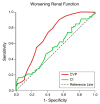Importance of venous congestion for worsening of renal function in advanced decompensated heart failure
- PMID: 19215833
- PMCID: PMC2856960
- DOI: 10.1016/j.jacc.2008.05.068
Importance of venous congestion for worsening of renal function in advanced decompensated heart failure
Abstract
Objectives: To determine whether venous congestion, rather than impairment of cardiac output, is primarily associated with the development of worsening renal function (WRF) in patients with advanced decompensated heart failure (ADHF).
Background: Reduced cardiac output is traditionally believed to be the main determinant of WRF in patients with ADHF.
Methods: A total of 145 consecutive patients admitted with ADHF treated with intensive medical therapy guided by pulmonary artery catheter were studied. We defined WRF as an increase of serum creatinine >/=0.3 mg/dl during hospitalization.
Results: In the study cohort (age 57 +/- 14 years, cardiac index 1.9 +/- 0.6 l/min/m(2), left ventricular ejection fraction 20 +/- 8%, serum creatinine 1.7 +/- 0.9 mg/dl), 58 patients (40%) developed WRF. Patients who developed WRF had a greater central venous pressure (CVP) on admission (18 +/- 7 mm Hg vs. 12 +/- 6 mm Hg, p < 0.001) and after intensive medical therapy (11 +/- 8 mm Hg vs. 8 +/- 5 mm Hg, p = 0.04). The development of WRF occurred less frequently in patients who achieved a CVP <8 mm Hg (p = 0.01). Furthermore, the ability of CVP to stratify risk for development of WRF was apparent across the spectrum of systemic blood pressure, pulmonary capillary wedge pressure, cardiac index, and estimated glomerular filtration rates.
Conclusions: Venous congestion is the most important hemodynamic factor driving WRF in decompensated patients with advanced heart failure.
Conflict of interest statement
Figures



Comment in
-
The cardiorenal syndrome: do we need a change of strategy or a change of tactics?J Am Coll Cardiol. 2009 Feb 17;53(7):597-599. doi: 10.1016/j.jacc.2008.11.012. J Am Coll Cardiol. 2009. PMID: 19215834 No abstract available.
-
Venous congestion and worsening renal function.J Am Coll Cardiol. 2009 Aug 11;54(7):661; author reply 662. doi: 10.1016/j.jacc.2009.03.074. J Am Coll Cardiol. 2009. PMID: 19660699 No abstract available.
-
Relationship of venous congestion to worsening renal function.J Am Coll Cardiol. 2009 Aug 11;54(7):661-2; author reply 662-3. doi: 10.1016/j.jacc.2009.03.073. J Am Coll Cardiol. 2009. PMID: 19660700 No abstract available.
References
-
- Sackner-Bernstein JD, Skopicki HA, Aaronson KD. Risk of worsening renal function with nesiritide in patients with acutely decompensated heart failure. Circulation. 2005;111:1487–91. - PubMed
-
- Heywood JT. The cardiorenal syndrome: lessons from the ADHERE database and treatment options. Heart Fail Rev. 2004;9:195–201. - PubMed
-
- Hillege HL, Girbes AR, de Kam PJ, et al. Renal function, neurohormonal activation, and survival in patients with chronic heart failure. Circulation. 2000;102:203–10. - PubMed
-
- Krumholz HM, Chen YT, Vaccarino V, et al. Correlates and impact on outcomes of worsening renal function in patients > or =65 years of age with heart failure. Am J Cardiol. 2000;85:1110–3. - PubMed
-
- Forman DE, Butler J, Wang Y, et al. Incidence, predictors at admission, and impact of worsening renal function among patients hospitalized with heart failure. J Am Coll Cardiol. 2004;43:61–7. - PubMed
Publication types
MeSH terms
Substances
Grants and funding
LinkOut - more resources
Full Text Sources
Other Literature Sources
Medical

